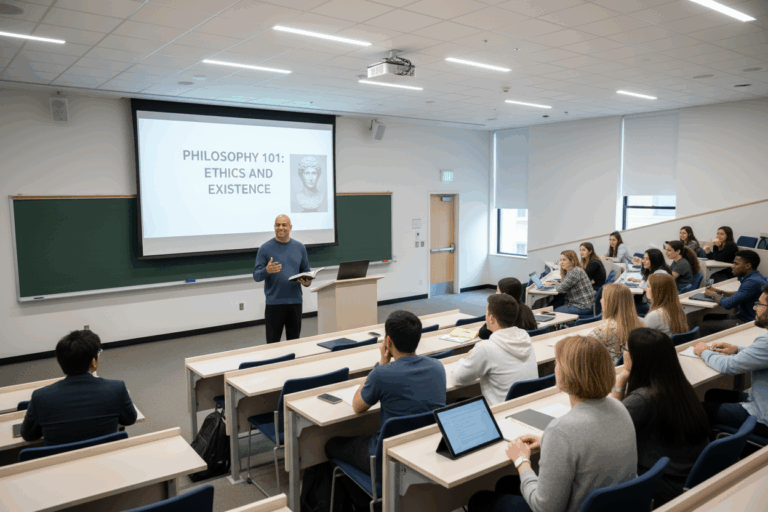How I Developed and Validated ΦPhilosophit™
By Dr. Shyam, Founder of ΦPhilosophitTM
Validation
In business, validation is the process of confirming that a product or service genuinely meets a real-world need and delivers value to its intended audience—not just in theory, but in practice. Philosophit™ is not just an abstract idea I dreamed up. I’ve been a researcher for 30 years, a teacher and scholar for 25, and in that time, I’ve taught thousands of students. Without intending to, I validated Philosophit™ simply by giving my program to my students. The overwhelming response was that Philosophit™ was transformative.
The ages of my students varied—from young adults in their 20s to seniors in their 70s—and the results were always the same: transformation. For those who stuck with it, the change was so profound that they often described their lives in two distinct chapters:
- Before Philosophit™
- After Philosophit™
Barriers to Getting the Most Out of a Philosophy Education
Not everyone sticks with learning philosophy long enough to experience its benefits. This is partly because philosophy—especially as it is often taught—can alienate the very people it aims to help. Many introductory courses lean heavily on abstract puzzles, technical logic, and Eurocentric canonical debates, while neglecting practical ethical reflection and non-Western traditions. This disconnection from the full range of human intellectual history can make philosophy seem irrelevant or detached from real life.
Another barrier is the way philosophy is sometimes presented as a contest of cleverness rather than a search for understanding and ethical clarity. When teaching emphasizes argumentation as an intellectual sport, it risks leaving students feeling judged, excluded, or unprepared to connect philosophical insight to their own challenges. Add to this the intimidating jargon, the absence of relatable examples, and the lack of clear pathways to applying ideas, and it’s no surprise that many students walk away before they can discover philosophy’s transformative power.
My Unique Way to Philosophy
I began my journey with a pressing question: why did academics unanimously hold that there was no practical—moral or political—philosophy outside of the Western tradition? This view showed up in claims such as the idea that ancient Indian philosophers were uninterested in questions about how to live and what to aim for. I knew this was wrong. But proving it meant showing that the error came from how academics approached philosophy itself: they failed to treat it as a set of practical skills for understanding options—a method I call explication, which is the practice of rendering reasons explicit so we can choose. Instead, they relied on interpretation, which frames ideas in terms of one’s own outlook or beliefs.
Because academics used their own outlooks to make sense of ideas from outside the Western tradition, they could never fully understand what they found—those ideas simply didn’t fit within their preconceptions. By sticking with explication, I discovered that this was precisely how ancient Indian thinkers approached philosophy. Through several groundbreaking publications and edited volumes that challenged and dispelled these myths, I was able to share these practical, logic-based philosophical skills with my students, often by translating and teaching from this ancient, overlooked tradition.
What emerges from the ancient South Asian approach is the idea of philosophy as Life Athlete preparation—training for the battles of life and the overcoming of adversity. I call this Phitness. It is based on explication. Relying on the methodology of explication, and teaching my students to engage in it, was without exception transformative for anyone who cared to listen.
From Philosophy to Philosophit™
The methods I developed in the classroom didn’t just give students new ideas—they gave them tools. By focusing on explication (understanding reasons) rather than interpretation (going with our perspective), I helped them uncover the actual range of choices available to them in life, free from the limits of inherited assumptions or borrowed worldviews. This wasn’t philosophy as an abstract pursuit; it was philosophy as training—rigorous, practical, and immediately applicable.
Phitness, based on explication, helps us get away from projection and confirmation bias, and toward understanding and transparent choosing. When we use our own perspectives and beliefs to understand options, we project and can never learn anything new. And when we think we are learning, we are really just engaging in confirmation bias, which is the error of only ever acknowledging what you were predisposed to believe.
Over time, it became clear that what I was doing was much more than teaching a course. I was running a structured program that built whole-person strength: integrating mind, body, and senses into a coherent, resilient self, capable of meeting challenges head-on. Just as an athlete trains for competition, my students were training for life’s real battles—whether those battles were personal, professional, or existential.
I started sharing my teaching online with students who were interested in philosophy, and it was there that I began seeing results in a new way. In university classrooms, students often have conflicting motives for taking a course, and it’s not always to learn—sometimes it’s simply to fulfill degree requirements. But online, the students were signing up out of genuine curiosity, and what they discovered was nothing they had anticipated: personal transformation.
This was the beginning of Philosophit™. It distilled decades of research, teaching, and translation into a system that anyone could engage with to build the capacity for self-determination. And the results spoke for themselves: transformation across all ages, backgrounds, and life stages. It’s why so many who experienced it drew the same dividing line in their lives:
- Before Philosophit™
- After Philosophit™
Philosophit™ was born from the realization that philosophy, taught as a skill in understanding and choosing, is the most powerful form of personal training there is.
Why Isn’t Philosophit™ Just How Coaching and Teaching Philosophy is Done?
Because what’s normalized in much of coaching and academic teaching is interpretation—leaning on beliefs, assumptions, and outlooks—rather than explication, the disciplined work of making reasons explicit so people can actually choose. When teaching and coaching revolve around affirming a client’s or student’s worldview, the result isn’t transformation; it’s pandering.
I know this persists, in part, because it’s easier to manipulate people who aren’t building their own independence. Dependency is profitable: instead of developing skills for living successful, autonomous lives, many programs cultivate cycles of return—mentees keep coming back to coaches who don’t teach, but who satisfy the emotional need to have outlooks validated. That landscape creates a wide market for snake oil and plenty of room for charismatic personalities to exploit needy mentees.
Philosophit™ is different. I’ve built it as a values-based coaching business committed to explication and genuine skill-building. My aim is independence, not dependency. While it might be easier to sell quick fixes, I train my life-athletes (my mentees) to think clearly, choose effectively, and act with integrity—so they can live their best lives without needing me to hold their hand.
This focus on avoiding quick fixes in favor of deep and lasting transformation is part of my story. Based on my own scholarship, teaching, and research—which turned myths on their heads and delivered ancient teachings of the hero’s preparation for everyday students—what I offer is itself an outcome of the very independence I teach. I’m certain that, in the years to come, others will try to mimic what I’ve created. And for every one of the life-athletes I train, I hope they are able to share this skill and wisdom with others. But as always, when starting out, it’s important to learn from someone who has done the work. And that’s why I started Philosophit™. It was validated before it became a business.


